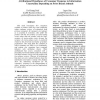Free Online Productivity Tools
i2Speak
i2Symbol
i2OCR
iTex2Img
iWeb2Print
iWeb2Shot
i2Type
iPdf2Split
iPdf2Merge
i2Bopomofo
i2Arabic
i2Style
i2Image
i2PDF
iLatex2Rtf
Sci2ools
129
click to vote
HICSS
2008
IEEE
2008
IEEE
Integrating Conflicting Reviews: Attributional Hypotheses of Consumer Response to Information Uncertainty depending on Prior Bra
This study investigates how consumers evaluate a product when they read conflicting online consumer reviews of evaluations from previous consumers. If consumers are rational, as is assumed in economics, they prefer the product with the low-variance of review-rating scores rather than the product with the highvariance of review-rating scores because the variance of review-rating scores is positively related to the perceived uncertainty of product performance. Our study finds the condition in which consumers are likely to act irrationally, and explain why consumers have irrational behavior with attribution theory. When attributional bias occurs, consumers with a favorable prior brand attitude prefer the product with high-variance reviews over the product with low-variance reviews. Whereas, if attributional bias does not exist, rational behavior about the information uncertainty is found. Our findings show the underlying mechanism for the consumers' responses to the disagreements of...
| Added | 08 Dec 2010 |
| Updated | 08 Dec 2010 |
| Type | Conference |
| Year | 2008 |
| Where | HICSS |
| Authors | Do-Hyung Park, Ingoo Han |
Comments (0)

